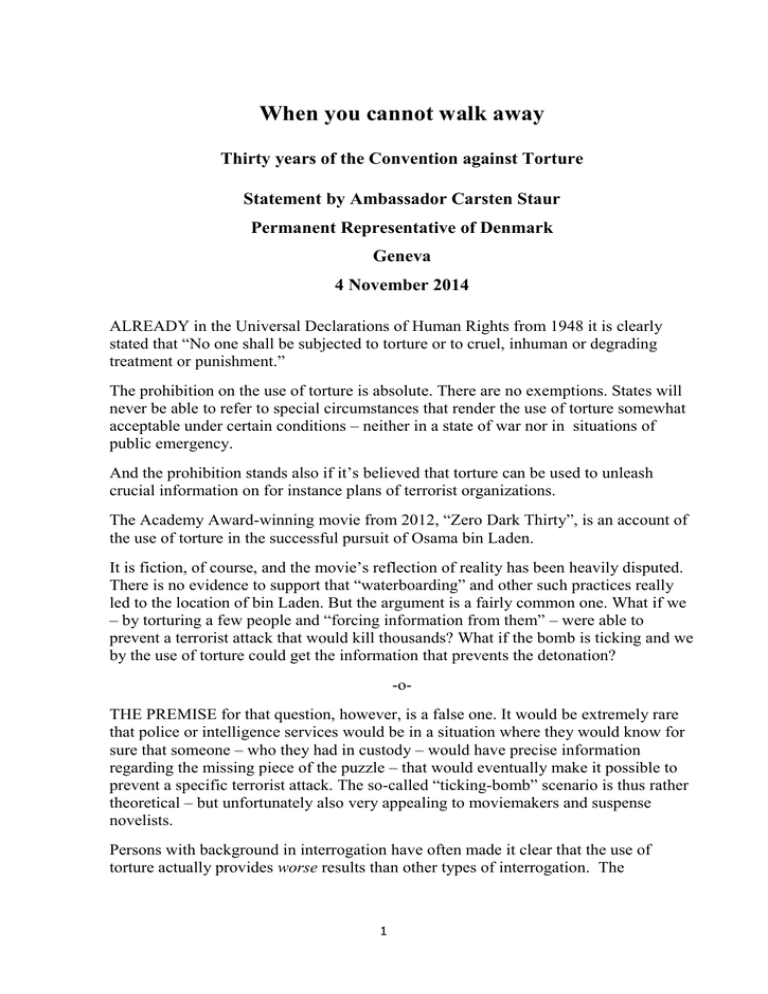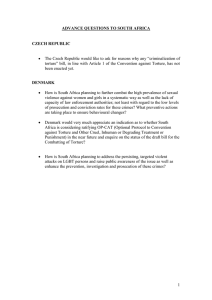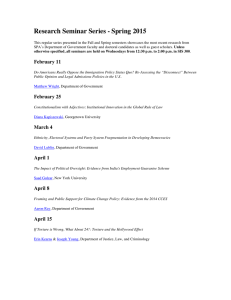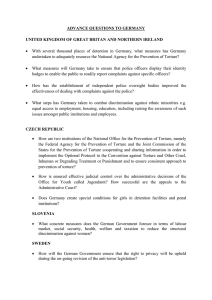When you cannot walk away
advertisement

When you cannot walk away Thirty years of the Convention against Torture Statement by Ambassador Carsten Staur Permanent Representative of Denmark Geneva 4 November 2014 ALREADY in the Universal Declarations of Human Rights from 1948 it is clearly stated that “No one shall be subjected to torture or to cruel, inhuman or degrading treatment or punishment.” The prohibition on the use of torture is absolute. There are no exemptions. States will never be able to refer to special circumstances that render the use of torture somewhat acceptable under certain conditions – neither in a state of war nor in situations of public emergency. And the prohibition stands also if it’s believed that torture can be used to unleash crucial information on for instance plans of terrorist organizations. The Academy Award-winning movie from 2012, “Zero Dark Thirty”, is an account of the use of torture in the successful pursuit of Osama bin Laden. It is fiction, of course, and the movie’s reflection of reality has been heavily disputed. There is no evidence to support that “waterboarding” and other such practices really led to the location of bin Laden. But the argument is a fairly common one. What if we – by torturing a few people and “forcing information from them” – were able to prevent a terrorist attack that would kill thousands? What if the bomb is ticking and we by the use of torture could get the information that prevents the detonation? -oTHE PREMISE for that question, however, is a false one. It would be extremely rare that police or intelligence services would be in a situation where they would know for sure that someone – who they had in custody – would have precise information regarding the missing piece of the puzzle – that would eventually make it possible to prevent a specific terrorist attack. The so-called “ticking-bomb” scenario is thus rather theoretical – but unfortunately also very appealing to moviemakers and suspense novelists. Persons with background in interrogation have often made it clear that the use of torture actually provides worse results than other types of interrogation. The 1 interrogated person either lies, suppresses vital pieces of information or only tells part of what they know, and too little to provide coherent and actionable information. Torture is however normally not used to gain intelligence. Torture – and other sorts of inhuman or degrading treatment of persons by authorities – is used to break people – physically and psychologically. This makes the absolute prohibition on the use of torture a crucial element in the understanding of human rights, which essentially revolve around the relation between individual and state and around the protection of the individual against violations by the state. One can hardly image a worse violation of a person’s dignity and personal integrity – than being subjected to torture. “Waterboarding” that creates a profound sense of drowning, sleep deprivation, a forced inferno of noise, being placed or hung in positions that inflicts pain, systematic beatings of the body or particular limbs, and rape are some of the torture methods that are used. And there are plenty more. To violate a person’s natural physical or psychological integrity with the purpose – not of killing them instantly, but of destroying their will and ability to live and thus killing them slowly – is cruelty in its purest form. That torture exists, and continues to be used, is a testimony of societal brutality and a total disregard of humanity. -oEVEN THOUGH at very rare occasions there may be real time situations that approach the “ticking-bomb” scenario these must constantly be weighed against the loss of political – and moral – legitimacy that the use of torture implies. You simply loose the moral high ground. A struggle over values is rarely won by taking the lowest common denominator as the starting point. For a society, trust between individuals and the state is crucial. To be able to safely address a police officer in the street, and not having to fear for your own personal safety if you are detained actually matters. That you have a fundamental trust in authorities treating you properly if you end up in a situation, where you cannot walk away. If you are arrested, detained, imprisoned or involuntarily committed to a psychiatric hospital. That is why the fight against torture is so crucial in the continuous struggle to strengthen the rule of law in societies. This was the background of the adoption of the United Nation’s Convention Against Torture in 1984. This is why 156 of the 193 UN member states have ratified the Convention, and thus committed themselves to enforce the prohibition on the use of torture and being accountable to the UN’s Committee against Torture (CAT). 2 156 member states are a lot. But not enough. We need to get everyone onboard. We need to achieve universal ratification. --WHY do some countries hesitate to make this commitment? Bad conscience and the fear of critique might be the answer from some. But no country has a completely clean record when it comes to dealing with the difficult intersection between state and individuals and how authorities use their power over individuals. There is always the risk of the balancing act failing and the result being, if not torture, then degrading treatment. Methods of arrest, pretrial-detention conditions, prison-conditions and fixation of psychiatric patients. These are all examples that all countries continuously need to work on. It is positive that most countries acceding the Convention against Torture are aware that this step must be followed by reforms of police behavior, penitentiary systems and psychiatric treatment procedures. But if a country insists on waiting to take on the commitments of the Convention until conditions are perfect – it will most likely have to wait forever. It’s important to identify the problems that need to be dealt with in the context of accession to the Convention – and those that can be dealt with afterwards. And it is important to remember that the challenges that need to be addressed in the long run often are better solved through the dialogue with the experts of the Committee against Torture, which can be initiated after ratification of the Convention. Some countries are also concerned about the commitment to regularly report on their compliance with the convention. Trustworthy reporting on what is being done to prevent torture requires data gathering and data evaluation and this can be both difficult and demanding. But without data it is generally difficult to take political decisions or change the status quo. So it is a piece of work that needs to be done anyway. -oIN MARCH this year these reflections led Denmark, Morocco, Ghana, Indonesia and Chile to launch a new initiative, aiming at universal ratification and implementation of the Convention against Torture within the next 10 years. The Convention against Torture Initiative (CTI) is a political initiative aiming to create renewed attention to the Convention and initiate a dialogue with countries that still have not ratified it. One way to achieve this will be to get countries in the same situation to share experiences and inform each other of how they have dealt with the various demands that follow the Convention. Small island states, for example, need the inspiration from the deliberations which other small island states with limited resources have had before they ratified. Neighbors often learn the most from each other. 3 Countries may need help and support to implement reforms of their police force, new methods of investigation, expanded training and use of new standards in police work. There is also a need for more resources in the prison system in many countries. Bottlenecks in the judicial system mean that people often are in custody for an excessive time suspected of petty crimes. If you just once have visited a prison in a poor country, built for 350 prisoners, but now with 750 inmates living under deeply miserable conditions, you know that there is a challenge here. But if the political will is there, and the problem primarily concerns weak institutions, lack of management capacity and limited resources, it is of utmost importance that the international community is willing to help. In the short term it is about getting the nearly forty countries, which have still not joined the club, to do so and to accede to the Convention against Torture. But we would also need to have the countries that have already ratified the convention to take the task even more seriously. -oALL COUNTRIES THAT have ratified the Convention against Torture have to report to the UN every four years on what they have done to fulfill their obligations under the Convention. However, many reports have been long overdue, and there are actually some twenty plus countries that have yet to submit their very first report. And without reporting it is difficult to hold governments accountable. Many countries have also expressed reservations regarding parts of the Convention. These reservations should be removed. One of the main reservations concerns redress to individuals, in accordance with article 22 of the Convention. Only 66 countries have given individuals the right to complain to the UN Committee against Torture, if they believe they have been subject to torture. And only 74 countries have joined the so-called Optional Protocol (OPCAT), which entered into force in 2006, and which contains two additional preventive tools in the fight against torture: First, that countries should establish national preventive mechanisms against torture, and second, that countries provide access to unannounced visits to detention centers, prisons and closed institutions for the Special Committee for the Prevention of Torture (SPT) established under the Protocol. Thus, issues like better reporting, acceptance of individual complaints and accession to OPCAT are also important goals for CTI. -oDENMARK HAS FOR many years taken a leading role in UN efforts to combat torture - and we have for many years been the initiator and driving force behind the resolutions against torture presented and adopted both in the UN General Assembly and in the UN Human Rights Council. In addition to confirming the universal political 4 support for the fight against torture, these resolutions continuously help to push boundaries and strengthen international efforts. Issues such as the aggravating circumstances surrounding doctors’ and nurses’ involvement in torture, when this happens, and the need to globally strengthen the work of rehabilitation of torture victims are among the topics on which we have sought to create clearer norms and more awareness. Obviously, in close cooperation with the UN and international NGOs that also make a great and important effort to strengthen civil engagement in the fight against torture. If this fight is to be successful, and if we – in 2024 – not only shall be able to achieve universal ratification of the Convention, but also universal implementation of the prohibition of torture, it will require a very strong focus on the legal sector in each country over the coming years. Police, prosecutors, courts and prisons will largely be at the center – with emphasis on strengthening these institutions’ legal framework, standards, capacity, economy and independence. It will be a major challenge. But the fight against torture is more than just another human rights issue. It is at the heart of the protection of personal integrity and safety and at the core of their relations with authorities and government as such. The key is the sense of personal safety and security and the assumption, that in situations where a citizen cannot just walk away from the powers of government, he or she will be treated properly and with respect. As the international community we must continue to combat torture as effectively and decisively as we can. It’s a fight we cannot, and should not, walk away from. 5





